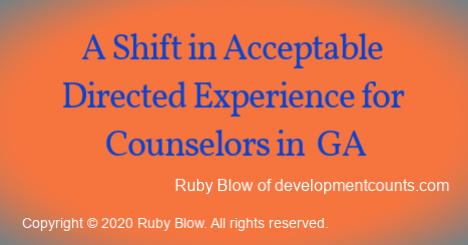Proper Guidance
Associate Professional Counselors in Georgia face a series of dilemmas and challenges. The biggest of these challenges is obtaining proper guidance as they navigate the pre-licensure process. The greatest single source of proper guidance is the clinical supervisor.
Many clinical supervisors are equipped to provide guidance and feedback on therapy, diagnosis, treatment planning and documentation. However, another critical aspect of supervision is following, understanding and implementing the directed experience under supervision practice guidelines as set forth by the GA Composite Board for Licensed Professional Counselors, Clinical Social Workers, and Marriage & Family Therapists.
When supervisees neglect this important aspect of their supervisory needs, they compromise their ability to obtain the LPC. Sadly, they don’t find out until they apply for licensure and are not issued the LPC because of some critical errors that could have been corrected.
Ethics-Competence
The first responsibility of counselors at every stage of practice involves practicing ethically. Ethical practice includes following laws, regulations and ethical guidelines. It is vital for counselors and supervisors to read the composite board rules including the codes of ethics including rules 135-7-.01 through 135-7-.07.
Directors, Supervisors and Counselors should all familiarize themselves with the ethical codes. If you have not read them or if you’ve only viewed them once or twice, I highly recommend that you re-visit them regularly. Not knowing the ethical guidelines is not a viable defense against not following the ethical guidelines.
When Counselor/Supervisees presume that their employers/directors are advising them along ethical guidelines without reading and understanding the rules for themselves…they run the risk of practicing unethically. The risk factors here run high – including illegal practices like submitting fraudulent information to 3rd party payers.
Private Practice
Many post-graduate school/pre-licensed counselors will have opportunities to work in private practice settings. While it is perfectly acceptable for counselors pursuing their LPC’s to work for private practices, it is my long held understanding and advisement that they cannot “be in private practice.” This implies that they are their own employer and practicing independently.
Additionally, non-licensed counselors (this includes APC’s who are associate counselors) have to be very cautious about seeing clients with insurance when insurance is being used to pay for the therapy. Not all contracts with insurance companies are the same. In many cases, those directing and billing for the practice may or may not be familiar with what is allowable with regard to billing and what is not.
If an independently licensed person such as an LPC or a Licensed Psychologist has their own contract with say BCBS or Aetna, this does not necessarily extend to their employees or contractors. If clients are paying co-pays or co-insurance and they come into the practice under the guise of seeing the licensed provider who has the contract with the 3rd party payer and instead they see a pre-licensed/un-licensed counselor, multiple problems can ensue. Including insurance not paying for the service and the client being stuck with a high bill. Not to mention that the counselor themselves may never be paid for the work. Lastly, this is a violation of the contract with the insurance company and possibly constitutes fraudulent billing.
For non-licensed counselors it may be best to work in practices that promote private pay fees for the Associate Counselor or post-graduate school counselor’s services. If not have an in depth conversation and perhaps a thorough review of both the contracts with the 3rd party payer to see if you are an allowed provider under your employers contract.
No Right to Private Practice Statement
I highly recommend that all supervisors obtain a “no right to private practice” statement that outlines the limitations of practice for their supervisees. Lastly, it is vital as supervisees’ work opportunities unfold and evolve that each setting be evaluated for its ability to uphold the limitations of practice. Despite the labor laws regarding contractors vs. employees, I am not a big fan of practices that charge supervisees rent. It is my sincere belief that these types of arrangements place undue pressure and responsibility on non-licensed counselors.
I believe the era of the LAPC/APC designation over the past almost 20 years has led to misconceptions about the level of independence implied by the associate counselor designation. When employers advertise that they have “licensed providers” in reference to Associate Professional Counselors who hold a license as an APC, they are either ignoring or are not aware that these statements are misleading to the public. Those statements are against board rules that specifically state APC’s may only refer to themselves as Associate Professional Counselors.
Lastly, the feelings and beliefs around what the APC (also referred to as LAPC) represents to those who hold the designation is that they should know more than they know and be more expert than they in fact might be…particularly early in practice. These beliefs and pressure contribute to feelings among APC’s of being underappreciated and under valued. After all they have a “license.”
My continuing education event “Providing Guidance: a Counseling Supervisor’s Ethical Responsibility to Follow GA Licensing Laws,” is being offered every year at least once a year to assist supervisors with providing more effective guidance to supervisees. It is workshop #5 on my list of supervision related workshops.
Copyright © 2017 Ruby Blow. All rights reserved.
Share your thoughts on Linkedin, Facebook, Twitter or log in to one of your accounts below to comment. Subscribe to my YouTube channel.





